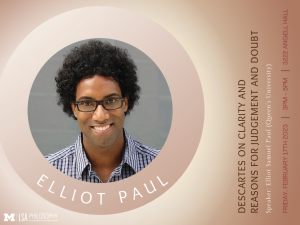Presented By: Department of Philosophy
Descartes on Clarity and Reasons for Judgement and Doubt - Cancelled
Department Colloquium: Elliot Paul (Queen's University)

Title: Descartes on Clarity and Reasons for Judgement and Doubt
Abstract: Commentators increasingly recognize that, for Descartes, when you perceive something clearly and distinctly, you thereby have a normative reason (not just a psychological compulsion) to judge it to be true. They haven’t been able to explain why, however, because they haven’t identified what clear and distinct perception is. I argue that distinctness is just the highest degree of clarity – complete clarity – and that clarity is presentationality, i.e. the phenomenal quality you experience when something is presented to you as true. Anticipating a current view called Presentationalism, Descartes holds that presentationality (clarity) provides reason for judgment: when you perceive p clearly, you thereby have reason to judge that p is true, precisely because p is presented to you as true. Today’s Presentationalists posit only defeasible reasons for judgement – ones that can be defeated by reasons for doubt. Descartes is bolder in asserting that the highest degree of clarity – complete clarity – provides indefeasible reasons for judgment – ones that preclude any possible reason for doubt. Why? The answer, I argue, flows from a unified account wherein all epistemic reasons – reasons for assent and reasons for doubt – arise from clarity.
Abstract: Commentators increasingly recognize that, for Descartes, when you perceive something clearly and distinctly, you thereby have a normative reason (not just a psychological compulsion) to judge it to be true. They haven’t been able to explain why, however, because they haven’t identified what clear and distinct perception is. I argue that distinctness is just the highest degree of clarity – complete clarity – and that clarity is presentationality, i.e. the phenomenal quality you experience when something is presented to you as true. Anticipating a current view called Presentationalism, Descartes holds that presentationality (clarity) provides reason for judgment: when you perceive p clearly, you thereby have reason to judge that p is true, precisely because p is presented to you as true. Today’s Presentationalists posit only defeasible reasons for judgement – ones that can be defeated by reasons for doubt. Descartes is bolder in asserting that the highest degree of clarity – complete clarity – provides indefeasible reasons for judgment – ones that preclude any possible reason for doubt. Why? The answer, I argue, flows from a unified account wherein all epistemic reasons – reasons for assent and reasons for doubt – arise from clarity.
Explore Similar Events
-
Loading Similar Events...
